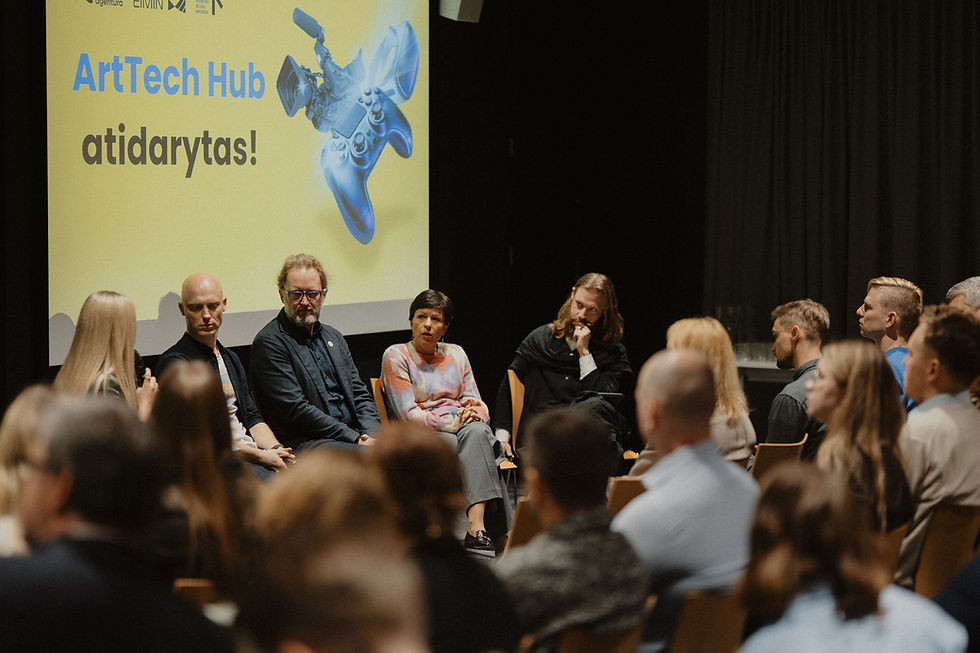For the First Time in Lithuania – a Two-Day Forum for Film Professionals
- Mar 13, 2025
- 4 min read
Updated: Sep 12, 2025

In March, cinema takes center stage – audiences flock to Kino Pavasaris screenings and share their thoughts on the films they’ve seen, international professionals arrive to discover Lithuania’s film industry and seek new talent at Meeting Point Vilnius, and – for the first time – film creators, distributors, cultural policymakers and stakeholders are invited to their own dedicated Lithuanian Film Forum, a two-day event taking place on March 19–20. The Forum is free of charge, and its organizers emphasize that such a knowledge-sharing conference has long been needed by the Lithuanian film community. Experts from Switzerland, the United States, the United Kingdom, Denmark, Estonia, and Lithuania will share their insights.
Film production volumes have grown 60 times
The Lithuanian Film Forum is organized by the Baltic Film & Creative Tech Cluster (established in 2020 through the merger of the Vilnius Film Cluster and the Nebula Cluster) and is partially funded by the European Union. Event partners: AVAKA, Meeting Point Vilnius, Kino Pavasaris, and the Vilnius City Municipality.

“Thanks to a well-functioning tax incentive for film production, volumes in Lithuania have grown nearly 60 times over the past 10 years. Major international films and series are now shot here, while Lithuanian productions win awards at the world’s most prestigious festivals. We can confidently say that Lithuania is already highly visible globally,” says Matulis, adding that with rapid growth come challenges. According to him, the industry lacks specialized production infrastructure, talent development and training programs, alternative financing sources, and innovative creative tech startups. Thus, the Forum seeks to create a shared vision for the future of Lithuania’s film ecosystem and outline measures for its implementation.

Film Producer Drazdauskas also celebrates the community’s achievements and recognition, but stresses that the geopolitical situation remains tense, and economic conditions for film production are constantly changing. “That’s why at the Lithuanian Film Forum, we’ll thoroughly examine the challenges facing our industry and explore the entire ecosystem – from the birth of an idea to reaching the audience. We’ll discuss nurturing the next generation, strengthening societal resilience, sustainability, and other relevant issues. We want to draw attention to international best practices and funding opportunities that can help strengthen Lithuanian cinema both locally and globally,” he says.
On film achievements, innovation, piracy, and viewing habits
On the first day, the Forum will present the current state, achievements, and challenges of Lithuania’s film industry. A presentation on the sector’s present and future vision will be followed by a discussion on political will and its importance for progress. Success stories will be shared, highlighting Lithuanian cinema’s victories at home and abroad, including recognition at prestigious festivals. The day will also feature a study on the health of Lithuania’s cinema exhibition sector and on piracy. To close, participants will discuss the opportunities and risks of applying artificial intelligence in filmmaking.
The second day will feature a study on small European film markets, comparing Lithuania to other countries, and an overview of the European film audience profile. Presentations will be followed by a discussion on the prospects of Lithuanian cinema in the international context. Topics of film education will also be covered, including the viewing habits of children and young people, and the industry’s role in nurturing future audiences.
The need for film education

Vilma Levickaitė, Head of the Film Culture Association, who is coordinating the Forum’s second-day program on education, notes:“In Lithuania, both policymakers and industry professionals still pay too little attention to cultivating future audiences – to developing their ability to choose quality content and to evaluate and analyze it critically. The problem is also reflected in numbers: according to the European Audiovisual Observatory, while film production volumes are increasing across Europe, cinema attendance is declining.”
Levickaitė stresses that more public resources and greater participation by film professionals in education are needed. Lithuania still lacks a strategic approach to audience development, as well as adequate state funding. One of the most glaring problems is the shortage of Lithuanian films for young audiences: only two feature-length films for children have been produced in the last five years.
International experts to share knowledge
The Forum will also provide professionals with fresh insights and practical skills. Among the invited international speakers are leading experts in their fields: Giona A. Nazzaro, Artistic Director of the Locarno Film Festival (Switzerland); Heidi Zwicker, Programmer at the Sundance Film Festival (USA); and Denis Krupnov, Head of UK-based production and sales company Reason8. Estonian producer and visionary Sten-Kristian Saluveer will review technological innovations in the film industry. To place Lithuanian cinema in the international context, Professor Jakob Isak Nielsen of Aarhus University (Denmark) will present his research findings.
Darius Vaitiekūnas, Head of AVAKA, one of the Forum’s partners, adds:“I sincerely hope the Lithuanian Film Forum will become a space where ideas, experiences, and people who care about the future of our cinema come together. It’s not only an opportunity for discussion but a necessity to involve state institutions, cultural policymakers, and everyone contributing to the growth of Lithuania’s film ecosystem in dialogue. Today, Lithuanian cinema is not just a creative force but also a significant economic and social factor shaping our society. I’m glad AVAKA can contribute to organizing this important event and foster constructive dialogue and sector growth.”
Practical information
The Lithuanian Film Forum will take place on March 19–20, 10:00–17:00, at Forum Cinemas Vingis (Room S06). The event is free of charge, but registration is required.
Organizers: Baltic Film & Creative Tech Cluster partners: AVAKA, Meeting Point Vilnius, Vilnius International Film Festival Kino Pavasaris, Vilnius City Municipality.Supported by: Independent Producers Association, Alliance of Author’s Cinema, Lithuanian Shorts, LMTA National Film School, Lithuanian Animation Association, Film Culture Association, Actors Guild, Women in Film & Television Lithuania (WIFT LT), cinema exhibitors, and other independent industry representatives.











